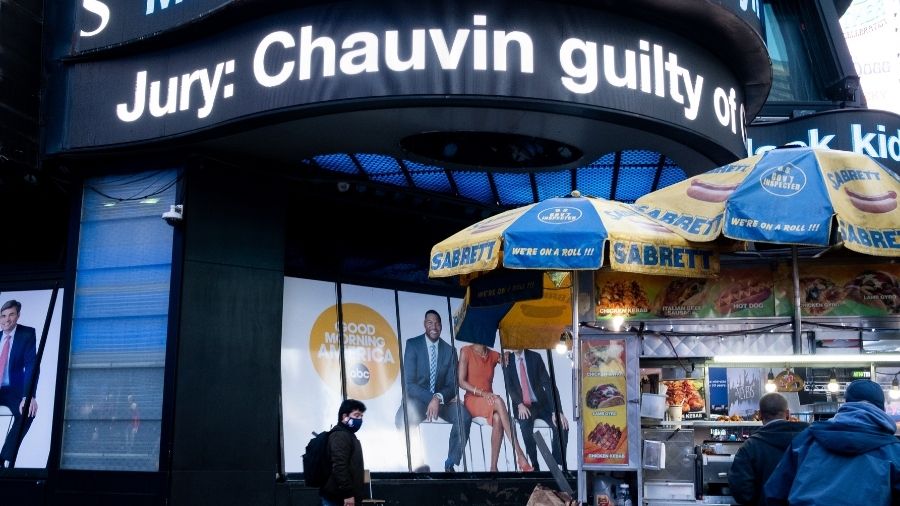Derek Chauvin was found guilty of two counts of murder on Tuesday in the death of George Floyd, whose final breaths last May under the knee of Chauvin, a former Minneapolis police officer, were captured on video, setting off months of protests against the police abuse of Black people.
After deliberating for about 10 hours over two days following an emotional trial that lasted three weeks, the jury found Chauvin, who is white, guilty of second-degree murder, third-degree murder and second-degree manslaughter for the killing of Floyd, a Black man, on a street corner last year on Memorial Day.
Chauvin faces up to 40 years in prison when he is sentenced in the coming weeks but is likely to receive far less time.
The verdict was read in court and broadcast live to the nation on television, as the streets around the heavily fortified courthouse in downtown Minneapolis, ringed by razor wire and guarded by National Guard soldiers, filled with people awaiting the verdict.
For a country whose legal system rarely holds police officers to account for killing on the job, especially when the victims are Black people, the case was a milestone and its outcome a sign, perhaps, that the death of Floyd has moved the country toward more accountability for police abuses and more equality under the law.
The city has been on edge for weeks as the trial progressed and the city awaited the verdict, with many worrying that a not-guilty ruling would bring renewed social unrest and chaos to a city that saw buildings set ablaze and widespread looting last year following the death of Floyd.
President Joe Biden and Vice President Kamala Harris watched at the White House on Tuesday as the verdict was read in the trial of Derek Chauvin, who was convicted on two charges of murder and one charge of manslaughter.
Biden said it was a “murder in the full light of day and it ripped the blinders off for the whole world to see the systemic racism in the country.”
“Systemic racism is a stain on our nation's soul. The knee on the neck of justice for black Americans. Profound fear and trauma. The pain, the exhaustion that black and brown Americans experience every single day,” Biden was quoted as saying by PTI.
The verdict giving justice, he said, is not enough.
“They’re a good family, and they’ve called for peace and tranquility no matter what that verdict is,” Biden told reporters earlier Tuesday. “I’m praying the verdict is the right verdict. Which is — I think it’s overwhelming, in my view.”
How much prison time Chauvin will have to serve will not be decided until several weeks from now, after a pre-sentencing report about Chauvin’s background is produced. Judge Peter A. Cahill will also have to determine whether there were special circumstances of the crime that would justify a lengthier sentence than the prison terms laid out by Minnesota’s sentencing guidelines.
Because Chauvin has no criminal history, the sentencing guidelines for each of the murder charges is 12.5 years. But the maximum sentences for each charge differ: Second-degree murder could mean as long as 40 years in prison, while the maximum for third-degree murder is 25 years. Chauvin was also convicted of second-degree manslaughter, which carries a maximum sentence of 10 years, but under the guidelines he would most likely be sentenced to four years.
Minnesota Attorney General Keith Ellison, the lead prosecutor in the state’s case against Chauvin, said during a news conference on Tuesday that “this is not the end,” and that his office expects to present another case this summer.
Ellison did not elaborate on the other case, but three other officers who were with Chauvin during the arrest face aiding and abetting charges and are scheduled to be tried together in August. At George Floyd Square, a crowd chanted “One down, three to go” after the verdict was read, in reference to the other three officers.
The guilty verdict on all three counts — second-degree murder, third-degree murder and second-degree manslaughter — is a major victory for Ellison and his team, who brought 35 witnesses to the stand over three weeks of emotionally grueling testimony. The case was one of the most high-profile in decades, and their successful plea to the jury, “Believe your eyes,” has further illustrated the power of video evidence in cases of police brutality.
Ellison praised the witnesses who testified during the trial — ranging from the chief of the Minneapolis Police Department to a 9-year-old girl who witnessed the arrest — many of whom condemned Chauvin’s actions during their testimony.
“We put everything we had into this prosecution,” he said. “We presented the best case that we could, and the jury heard us, and we’re grateful for that.”
(New York Times News Service)










